- Home
- Alaric Bond
Cut and Run: The Fourth Book in the Fighting Sail Series Page 9
Cut and Run: The Fourth Book in the Fighting Sail Series Read online
Page 9
“Summon the watch below and send them to quarters,” he said, coming to a decision. It would do the hands no harm to have their meal curtailed. “Douse the galley fire and issue small arms. Clear away guns three to eight.” The cannon were in the waist, where no cabins could be disturbed. Rigging them would make some sort of impression, as well as giving a limited amount of firepower for the least possible disruption.
“Seven an' eight are quakers, sir,” Willis reminded him cautiously, and Rogers let out an oath. It was true; the two guns beneath the break of the quarterdeck were just wooden half barrels, lodged to make the ship appear to be fully armed, while the real pieces were stowed in the hold for want of space.
“Then run out the quarterdeck batteries as well,” he spat.
“Deck there!” King's voice rang out. “I have them in sight.”
“What do you make?”
“They're sailing fast, and look to be privateers.” The last part was very much a guess, although they were behaving exactly like privateers with a rich prize in their sights.
“Colours?”
“Not that I can see, sir; but there are definitely just the two to the north. They're bearing down on the rear of the line, while the third seems bent on cutting us off. Wait, one is signalling.” Flags had broken out on the southernmost vessel, and everyone waited while King trained his glass upon her. There was an answering hoist from one of the other ships. “Looks to be a recognition signal, sir,” he said.
So, the three ships were from two separate forces, and had either met by chance or design, although it was clear they were after the same prey, and any question that they might not be sailing under a letter of marque could now be discounted. Pevensey Castle's departure from Deal may well have been witnessed, but the information could not have been conveyed in time without semaphore. No, it was far more likely that the French raiders were already at sea, staying out in the middle of the Channel and biding their time. When the wind favoured ships leaving the Downs, they would simply move closer inshore and see what was blowing their way. Rogers grunted to himself and took another turn about the deck. It was all happening so clinically. Really, the Navy was to be blamed. How many had been lost in just these circumstances? Yet, they allow one solitary frigate to protect three juicy Indiamen. His own ship might be taken from him by the end of the day; a splendid end to matters. He turned back and glanced across to the grey Kent coastline—and it was all being done within sight of British soil.
Chapter Six
The news radiated about the ship, and reached the other off-duty officers. Paterson and Nichols hurried up the quarterdeck ladder, followed by Seagrove who was still buttoning his waistcoat.
“Mr Seagrove!” The second mate jumped slightly at the sound of his name. Rogers strode towards him and pointed back down to the waist, where several groups of passengers now gathered.
“Organise the gentlemen into parties to repel boarders,” he said. At that moment, Kate came up the main companionway. “And get that purser woman to take the females below.” Seagrove touched his hat and turned back towards the main deck.
The women were soon shepherded away, and Rogers examined the male passengers while the second mate gathered them. Several were officers in the Company's army and could be expected to handle themselves adequately enough. The rest, the civilians, were mostly clerical types, but fit enough in the main. In fact, it mattered little that some were decidedly elderly. They might not fight terribly well, but the very act of being killed should at least slow the enemy down. At that moment the gunner and four seamen emerged from the forecastle with two small arms chests and began to solemnly hand out cutlasses, pikes, and firearms. Some of the civilians took them, with varying degrees of amusement and expertise. Seagrove was dancing about and rabbiting like an idiot, although no one seemed to be taking much notice of him. Rogers’s glance swept the deck for a replacement. Osborne, the master at arms, caught his attention; a powerfully built brute with square shoulders and a bullet head, he looked up from the waist and met the captain's eye with total competence.
“Mr Osborne, Mr Seagrove has some recruits for you, station them where you will.”
The man gave a knowing look and touched his hat as the men were surrendered to him.
“Form up on the gangboards, if you please, gents,” he growled, roughly organising the chattering passengers into a line and all but pushing them into place. “Plenty of time to play with your toys when the enemy comes a callin'.”
* * *
“John, you will cover for me for a moment?”
Paterson looked at the fourth mate, surprised. “Of course, will you be long?”
“Five minutes, no more,” Nichols assured him. He had a worried look on his face, and Paterson suspected he needed to relieve himself in some way.
“Take your time, I’ll see that the fightin' doesn’t start without you.”
Nichols nodded briefly before turning away. The captain seemed to be engrossed by the vision of the oncoming privateer, and he was able to slip behind his back and on towards the roundhouse entrance, under the poop.
He walked through the empty dining room cuddy. There were two cabins to one side, but both lay open, and the rooms were clearly empty. Nichols was not entirely sure where she berthed. Indeed, she might already be safe in steerage, but there were still a couple more to check, and he had come so far. A short narrow passage led to the cabins immediately next to the captain's quarters. He knocked at the first door and cursed under his breath when a male voice answered. It was Drayton.
Nichols drew back when the door opened. “Forgive me for disturbing you, sir.” He looked past the valet to Drayton who stood in the centre of the room adjusting his stock. “Privateers have been spotted, and we are likely to be in action.”
Drayton nodded and came forward to meet him. “We wondered at the commotion; it was good of you to inform me. I assume the captain sent you?”
“Yes, sir,” Nichols replied a little doubtfully. “I am to clear the roundhouse,” he continued, deciding that two lies were no worse than one.
“Then, I shall not detain you; we will leave immediately.”
Nichols waited until they were gone before knocking, a little more gently, on the door at the very end of the passage. Elizabeth Hanshaw answered and seemed surprised, but not displeased, to see him. He repeated his earlier warning, and she nodded seriously. “Is there danger?”
“I fear so, ma'am.” Again Nichols felt strangely stupid in her presence. “But naturally we will do all we can to see you come to no harm. Perhaps if you made your way below?”
“Of course,” she smiled, and it was a pleasant expression. “Thank you for coming to tell me.”
Their eyes met. “I could conduct you if you wish?”
“No, that will not be necessary. But thank you again.” She paused. “I…I do not know your name.”
It was his turn to smile, but he knew that his version was far less appealing. “Nichols, ma'am; fourth officer.”
“Yes, yes; I am aware, Mr Nichols. I meant your Christian name,” she laughed. “I assume you have one?”
Now, he knew he was blushing. “Aye, ma'am; 'tis George.”
“George, like the king?” she asked, delighted.
“Aye, ma'am, just like the king, though not many call me by it.”
“Then indeed it is exactly the same, I am certain few address him as such!” Her look was still every bit as bewitching. “But you would not mind if I do?”
He shook his head almost sadly. “No, ma'am; I would not mind at all.”
* * *
The enemy was in plain view from the deck now, and clearly the vessels were moving quickly. Rogers looked up to the masthead. “What do you see there?”
A pause, then King's voice, slow and considered. “They look quite light, sir. Flush decked and twin masts. The easterly one's course appears to be to the southwest; I'd say they were trying to cut us off.”
Rogers grunted; typica
l privateer craft, and typical privateer tactics. Shearwater was doing the right thing in staying on station to windward but, with three attacking, the likelihood was strong that at least one would make it past her and to the rich prizes beyond.
“The two are changing course,” King called again. “Seem to be splitting up, one heading further south, t'other more to the east.”
With the wind in the northeast, they were in the perfect position to divide, making Shearwater's job that much more difficult and the possibility of at least one of the Indiamen being raided more certain.
“Shearwater is making sail,” Willis this time. All the officers looked to see the frigate raise royals above her topgallants. The canvas was soon full, and the ship began to cut deeper into the water as she surged forward. Pevensey Castle, the leading merchant, was soon overtaken, while several cables behind, the other two Indiamen also began to ply on extra canvas in an effort to close up.
“She's tacking!” Paterson's voice cracked slightly. Sure enough, the frigate was turning swiftly into the wind, her sails momentarily slack as she nosed her way about. The privateers were plainly heading in a fanlike formation for the merchants. Then, Shearwater was fully on the starboard tack beating back, as near to the wind as she could make.
“They'll be in range of the frigate at any time,” Paterson muttered. Certainly, the southernmost enemy, the one most likely to take Pevensey Castle, was nearing the escort’s arc of fire. Presumably the Frenchman was risking one broadside, and at the speed she was travelling there must only be time for one, against the chance of getting to grips with their ship. A line of smoke engulfed the British frigate, followed by a murmur of approval from the passengers. But, the shots must have been poorly laid for by the time the dull report of the broadside reached them, the privateer was still flying in their direction, apparently unharmed and closing fast.
The British frigate was turning to larboard, and her intention was clearly to fire broadsides at the other two ships, then wear and come back with the wind on her quarter. They were good tactics and should account for one or both of the privateers, leaving her poised to bear down fast and have a second try at the remaining ship, but it also meant that this last craft would be allowed to continue heading for Pevensey Castle. Rogers began to fume. They could fire their puny broadside, rig boarding netting, use spars to fend them off, and do whatever they could to repel the boarders, but the privateer would be crammed full of men and, once alongside, there would be little point in resisting further. He glanced at his watch and then at the oncoming privateer which was closing on them with a bone in its teeth. Less than half an hour, he reckoned, certainly no longer, and they would be taken.
* * *
The women were huddled together in the hold. Kate had removed the gratings and arranged for ladders to be lowered. After a token amount of persuasion, all had descended. Now, they sat on crates and casks, their long dresses held clear of the damp shingle in the dim light of three lanterns. Kate had also collected a small spirit stove along with crockery from the third mate's mess, and a kettle which was almost boiling.
“Susan, Emma, lay these out and distribute them, will you?” She pointed at the pile of white china cups that sat next to the trays. The girls stared at her, but did nothing.
“Did you hear what I said?” The water was boiling now. She began to spoon a generous measure of tea into the pot.
“We ain't your servants,” Susan said, a sullen expression on her face.
“No, you are employed by Mrs Drayton,” Kate replied in measured tones. “With luck, she should be joining us at Portsmouth, and I'm sure she will be overjoyed to hear how helpful you have been to her fellow passengers.”
Kate turned back to the pot, but watched out of the corner of her eye as the girls rose and began to assemble the tea things. Her gaze continued round to the other women, mostly passengers, and mostly chattering excitedly at the novel surroundings and the fact they might shortly be in action. Kate could not tell how they might react if it actually came to fighting, but was reasonably certain that the present high spirits would not last. She noticed Miss Hanshaw, sitting quietly next to a tier of beef casks and knitting. Their eyes met, and both smiled.
“Will you take tea?” Kate asked as she approached. She caught her eye and held the pot up. “I'm sure it’s within your victualling allowance.”
The girl laughed. “In that case, it shall be very welcome.”
Kate began to fill her cup. “I'm afraid there is no milk.”
“Really?” Elizabeth looked surprised and then considered for a moment. “That is a shame. Do you perhaps have a bucket?”
Kate eyed her quizzically. “A jug, might that do?”
She returned to the stove and held up a large pewter jug.
“Capital!” The girl put down her cup and knitting, sprang to her feet, collected the jug and made for one of the ladders. “Some of the cows above are Company property, I assume?”
“Why, yes.” Kate looked mildly puzzled. “And I suppose I should know which, but fear I do not.”
“It is no matter,” Elizabeth said, hitching her dress up with the hand that held the jug, and starting up the ladder. “We only need a pint or so; I'm certain it will not be missed.”
* * *
Rogers looked about his ship in mild desperation. The male passengers were standing along the larboard gangboard, fingering their weapons with rather more respect. Seamen were stationed at those larboard guns that had been cleared and ready. It took six men to serve each, so he was left with fewer than thirty actually sailing the ship. To starboard, the sands off Dungeness effectively blocked any chance of escape in that direction, and to turn and attempt to find shelter behind Shearwater would only present themselves to the privateers and make matters far worse. He had yet to take his ship through the eye of the wind, but even the poorest of seamen knew that a lubberly barge like Pevensey Castle would wallow hopelessly, taking forever to see the opposite tack. He glanced up. They were carrying topsails and topgallants, along with the forecourse and staysails; there was little more he could do in this wind—ominous creaks were coming from aloft as it was.
Shearwater was firing again now, this time at the centre of the three ships. A small cheer went up as the enemy vessel was neatly straddled by the shots, wiping her masts down as if they were nothing more than matchsticks and leaving her helpless.
“One down,” Nichols murmured to Paterson. They watched while the frigate, now heading almost directly away from them, made for the northernmost craft. The next Frenchman would be in range in minutes, but by the time Shearwater had dealt with it and turned about, Pevensey Castle would be fighting off the nearest of the privateers.
“Mr Paterson, Mr Nichols, you will assist Mr Seagrove in the waist.” Rogers had already decided that a fight was inevitable and wanted his third and fourth mates well out of the way, should he choose to surrender. He turned to the men at the nearest gun. “How are you set?”
“Round shot, sir.”
Ideally he should order the weapons drawn and reloaded with grape, but the time to think of that had long passed. To attempt to do so now, with inexperienced men, would probably see the guns empty as the enemy came alongside.
“Very well; each of you will hold your fire until you are ordered.” He looked up at the approaching privateer. She was well armed, with seven guns a side; they might be six or even nine pounders, and almost certainly more accurate and with a greater range than his own blown-out eighteens. Pevensey Castle's guns threw a heavier ball, but the barrels were short and the bores generous; point-blank range against a large enemy was about their limit. The Indiaman would probably be feeling the force of the privateer's weapons at any moment, and he was far more confident of their effectiveness.
Then while he watched, the enemy turned a couple of points to starboard, and the immediate threat was postponed. The French were clearly intending to close as fast as possible, then round their stern. Like everything else that was
playing out before him, the tactics were eminently sensible, although that hardly lessened his frustration. He felt his hands begin to shake and thrust them behind him, as he sought to adopt a determined attitude. If he allowed the enemy to attack from behind, Pevensey Castle could be raked, round shot running the length of the ship, smashing everything in their path. He bit his lower lip. There would be carnage. It must not happen, especially as he, standing on the quarterdeck with only the frail timbers of the poop to protect him, would be a likely casualty.
“A desperate situation, captain.”
Drayton's voice combined with the suppressed tension made Rogers physically jump. Where had he come from? Presumably the man was in his cabin in the roundhouse and had not been alerted until now.
“It was good of you to see that I was advised of the danger,” Drayton said.
Rogers looked at him cautiously, but made no comment. Thoughts of the roundhouse brought an obvious association, however. Elizabeth might still be in her cabin. He really should see that she was safe as well. For a moment, he considered despatching one of the midshipmen, then changed his mind. The girl could look after herself; she was only really steerage class, after all.
“Are we in danger, sir?”
“I fear so, Mr Drayton.” His tone was forced but strangely, even in such a situation, Rogers found it easy to speak lightly. “T'would be a shame to lose the ship so early into the voyage, and while still in home waters.”
“You think that likely, Captain?”
“It is indeed possible,” he continued, almost casually, as if there were nothing odd about indulging in light conversation while his ship was about to be attacked and boarded. Rogers thought for a moment. Was this the bravery that other men displayed in battle? He supposed so, and had certainly met with those who behaved in just the same way. He remembered even despising them a little for it. Rogers had been in action on several occasions, and each time fear, something he considered quite healthy, had made itself known. This was his first time as a captain, and he found himself performing like those stalwarts he always vaguely scorned. But did they also have to clamp their hands behind their back to prevent such a shaking? Rogers told himself that they did not, even though a curious inkling said that they might.

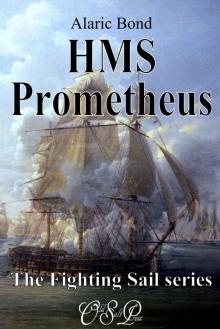 HMS Prometheus (The Fighting Sail Series Book 8)
HMS Prometheus (The Fighting Sail Series Book 8)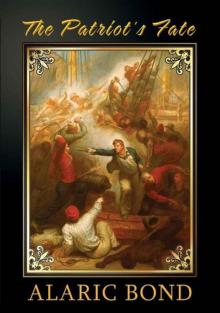 The Patriot's Fate
The Patriot's Fate The Blackstrap Station (The Fighting Sail series Book 9)
The Blackstrap Station (The Fighting Sail series Book 9)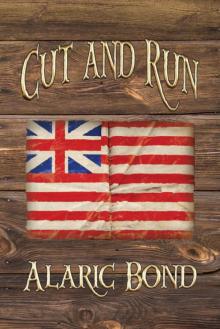 Cut and Run: The Fourth Book in the Fighting Sail Series
Cut and Run: The Fourth Book in the Fighting Sail Series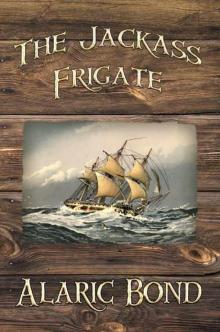 Jackass Frigate
Jackass Frigate The Torrid Zone (The Fighting Sail Series)
The Torrid Zone (The Fighting Sail Series)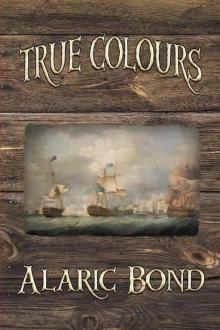 True Colours (The Third Book in the Fighting Sail Series)
True Colours (The Third Book in the Fighting Sail Series) The Scent of Corruption (The Fighting Sail Series Book 7)
The Scent of Corruption (The Fighting Sail Series Book 7)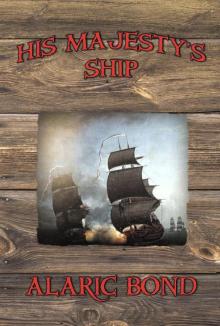 His Majesty's Ship
His Majesty's Ship